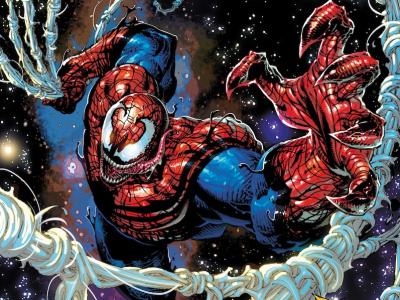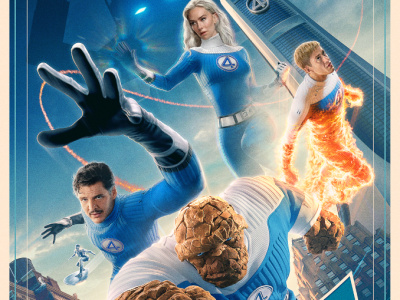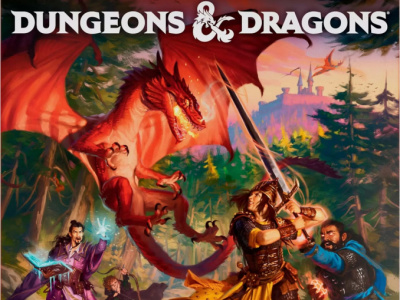Last month, Yongsoo Kim, CSO and Head of Global WEBTOON, issued some forecasts about the evolving state of the industry in response to an inquiry from ICv2. Considering WEBTOON's position in the industry, their view of things carries some weight notwithstanding Kim's not-exactly-impartial perspective. In this column, we'll take a look at his predictions one by one with a little bit of commentary.
My take: Ever since comics moved into the digital realm, going all the way back to the days of CD-ROM in the 1990s, well-meaning innovators have tried to incorporate multimedia aspects into comics storytelling. This yielded a few creatively interesting projects over the years, and was the main focus of Madefire, the reasonably well-funded startup from the mid-2010s, but it never exactly caught on as a mainstream phenomenon.
Swipe forward a decade to a generation marinated in vertically-scrolling short-form video, ruthlessly curated by algorithms and incentivized by business models rewarding high profile content creators, and maybe this has longer legs. We are just starting to see AI tools that can build short animations from still images, reducing a lot of the scutwork and expense required to deliver this kind of material at scale.
But the questions around this have never been about supply; it's been about demand. Do readers want comics in this format? Previous generations have said thanks but no thanks. WEBTOON is swimming against the current here, although they bring a lot more to the table.
Prediction #2: Human Creativity will Prevail, but Technology will solve a number of industry challenges. "From creator productivity to content protection, there are many ways in which technology will support the industry in positive ways, such as combatting piracy. Technology will also solve the challenge of finding a new comic in a sea of digital options, creating the kind of personalized digital experiences and recommendations that consumers have come to expect thanks to Netflix and streaming services. New technology tools won't replace creators. But just like digital drawing software changed how an earlier generation created comics, new digital tools will supercharge parts of the creative process."
My take: This is a politically correct take from a company that is well-positioned to take advantage of AI in all kinds of ways but is given pause by the fact that GenAI has become as toxic as NFTs in the creative community. Consumers are also increasingly giving the side-eye to the flood of "slop."
That said, the more mundane uses of AI, such as spotting patterns in unfathomably huge datasets, are tailor-made for the scenarios Kim describes. Behind the scenes, AI can absolutely ramp up anti-piracy for the benefit of creators and rights-owners, and can enable mass personalization and discovery to benefit readers. But the technology itself is a commodity. Whether WEBTOON or anyone can turn these tools to competitive advantage depends on the company's ability to execute.
Prediction #3: More Webcomics on Screens. "Webcomics are already hits on Crunchyroll, Netflix, Disney+ and other streamers. But relative to how much manga is adapted for anime or the incredible success of the MCU, webcomics have enormous growth potential to fuel the entertainment industry. With webcomics from creators all over the world--from the U.S. to Japan, Indonesia, Trinidad, the U.K., Mexico and beyond--this is content that can speak to local audiences while also producing global hits. As a digital format, fan behaviors – what they binge, comment on, and finish – will play an important role in shaping which stories get adapted."
My take: This one is less of a prediction and more a simple observation about the current market trends. I'd add that WEBTOON itself is tangibly helping this move forward, not just in its own efforts to license and commercialize its content through outside production firms and its own Wattpad WEBTOON Studio, but also by the platform's back-end metrics.
Let's face it: Hollywood producers are a cowardly and superstitious lot. They hate risk and they hate spending money on new things if there's a tried-and-true winner vying for the same budget. When WEBTOON pitches projects, it brings a ton of user data proving out the performance of its content at a granular level. That can change the conversation about what gets made, and turn this prediction into a self-fulfilling prophecy.
Prediction #4. Back catalogues Will be Reformatted and Reimagined. "The vertical scroll format revolutionized digital comics. Now that same innovation is being applied to traditional comics as publishers digitize and reformat their catalogues for digital distribution. Hard-to-find issues and content will be a thing of the past, as the entire history of comics is digitized. This will open up a new revenue stream to publishers' backcatalogues and – even more exciting – introduce a younger, mobile-first audience to the incredible art and storytelling that have defined comics for generations."
My take: This is #4 on Kim's list but probably the most consequential to ICv2 readers with a stake in the traditional comics industry. And it gets to the central mystery of the success of webtoons (and WEBTOON): does the content work because of the format, or does the format work because of the content?
These days a lot of successful webtoon creators grew up reading webtoons, as well as manga and manhwa. Their visual storytelling instincts are built around the nuances of the vertical scroll, and their genre, story and art choices lean into things that play well if you are reading on a small screen, one panel at a time. And guess what? It turns out when you create stories optimized for a very smart, sophisticated and well-capitalized user experience, you can do really, really well.
But can comics that were intended for the printed page, with artists designing with all of Scott McCloud’s principles of continuity and closure in mind, plus the nuances of full-page layouts and highly complex story structures, provide an equally satisfying experience? A bunch of companies, including GlobalComix (see "How Global Comix is Trying to Bring a Webtoon Reading Experience to Panel-and-Page Comics") and now Webtoon itself through recently announced deals with IDW Publishing and Dark Horse Comics (see "Webtoon Gets Five Dark Horse Properties"), are definitely throwing some effort into it.
Will reading comics in this form increase convenience and possibly readership? I expect so. Will this be The Revolution? The bets are now being laid.
Prediction #5: The Studio Model will Become More Common. "In the U.S., most of the Creators on WEBTOON are individuals or small teams producing a single series. In Korea, where the webcomic market and business has a longer history, webcomic studios and other kinds of content providers are much more common, with creative teams producing multiple titles at the same time. We're already seeing this model more outside of Korea, like the teams at Inspired Productions and Aethon in the U.S. and Flagcat in France, and I suspect we'll see more webcomic studios and content providers as the industry grows and creators collaborate in new ways."
My take: From a North American perspective, where comics are more often produced by studios or teams of specialized collaborators, one odd thing about webtoons is the prevalence of single-creator operations, even at scale. So this may feel like a shift from the user-generated content world from which webtoons emerged, but it's not terribly shocking that as the webtoon industry becomes more "professionalized" and "industrial," it will adopt many of the same modes of production as comics or manga.
Final verdict. Considering WEBTOON's leading role in the commercialization of vertically-scrolling digital comics, it's good to see that it is approaching its operations with a strategic view of the future of its industry. We can argue about whether these forecasts seem likely or not, but the fact they exist at all is encouraging. When is the last time we got Marvel’s perspective on the future of the comics business?
Quick teaser: if you are interested in further discussion of these issues, keep an eye on the San Diego Comic-Con program, as I just might be involved in such a panel. Until then, let's keep thinking about tomorrow.
The opinions expressed in this column are solely those of the writer, and do not necessarily reflect the views of the editorial staff of ICv2.com.
Rob Salkowitz (Bluesky @robsalk) is the author of Comic-Con and the Business of Pop Culture, a two-time Eisner Award nominee, and a proud longtime contributor to Eisner-nominated ICv2.










